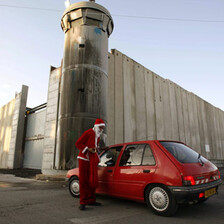The Guardian Bethlehem 24 December 2002
Once again, there is no room at the Bethlehem Inn. Two thousand years on, the hotel has been commandeered by Israeli soldiers, and just about every other lodging in Christ’s hometown will be closed on his birthday for lack of business.
For the first time in living memory there is no Christmas tree on Manger Square. Even the priests at the Church of the Nativity - the 4th-century basilica said to be built around the cave where Jesus was born - are down on the festivities at the end of a year that has seen Israeli tanks roll into the town five times and a 39-day army siege of the church itself. Now the ancient town is enduring a month-long curfew with no certainty the Israeli military will lift it for midnight mass on Christmas eve. Yet the services will go on, in no small part because of the politics of religion.
The Greek Orthodox, the Armenians and the Franciscans all command control of a share of the Church of the Nativity under a rights-of-possession agreement drawn up by the Turks in 1757, when Bethlehem fell in the orbit of the Ottoman empire. It is known as the “status quo”. Each church is allocated parts of the building, and specified time for services. None dares alter the schedule for fear of undermining the agreement and feeding the intense rivalries that have reduced priests to fisticuffs over territorial infringements during the annual cleaning.
But this year there will be no parade of boy scouts, choirs in the square or the sometimes raucous party ahead of the service. There will be no Yasser Arafat either, or his Christian wife to light the Christmas tree. The Israelis have banned the Palestinian leader from attending midnight mass for the second year running.
The Franciscan parish priest, Amjad Sabbara, will stick to the annual theme of children as he leads prayers during the first hours of Christmas day. But rather than celebrating birth, he plans to reflect on death — particularly the sickening reality that, just as in Jesus’s time, children are being killed by forces indifferent to their age or innocence. The latest victim is an 11-year-old girl leaning out of a window to watch the funeral procession of another child.
Father Sabbara was among the hundreds of people trapped in the Church of the Nativity during the Israeli siege in April and May. That was the busiest the church has been in a couple of years, with Palestinian men sheltering in the grotto built around the cave of Christ’s birth. The Franciscan priest predicts a smaller turnout than that for Christmas. Just 400 of the 2,000 once-prized tickets for seats at midnight mass have been taken. So most of Bethlehem’s hotels have closed and those few that have stayed open say they have no bookings.
Over the past month of perpetual curfew, lifted for just a few hours each week, Bethlehem has endured the punishment favoured by the Israelis against the people they rule. The army is largely of the view that Palestinians are either terrorists or terrorist sympathisers, so there’s no reason why they shouldn’t all suffer for the actions of a few.
But there is a deeper and longer crisis. When Bethlehem’s mayor, Hanna Nasser, can find a tourist, he offers chapter and verse on what the past two years of intifada and periodic occupation have done to the town’s economy. Bethlehem is dying, he says. For years, it has relied on tourism to survive. Now not a single one of the hundreds of gift shops is open to offer their bizarre mix of nativity scenes alongside T-shirts sporting the Israeli army logo. Seven out of 10 residents are unemployed. Average income, at about 1 pound a day, is just a quarter of what it was three years ago. The capital of Christmas, as the mayor puts it, is in no mood to celebrate.
